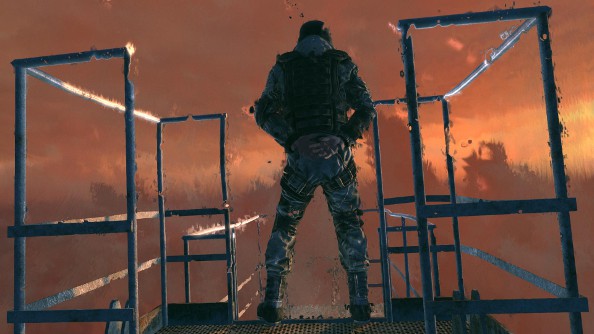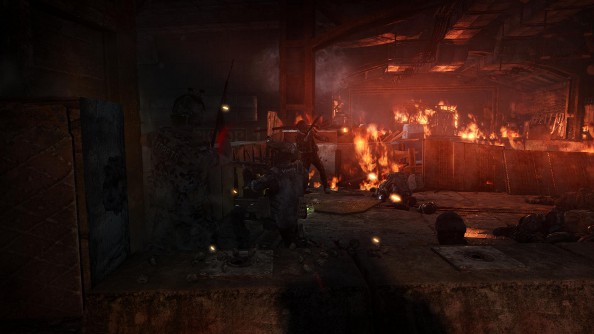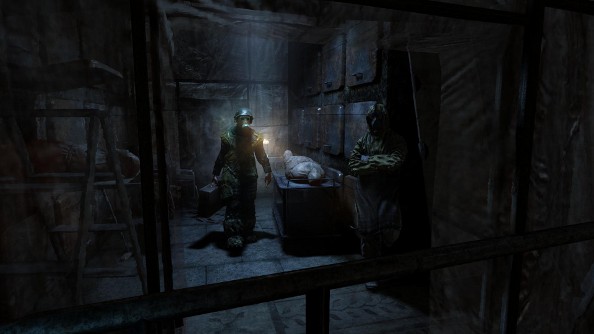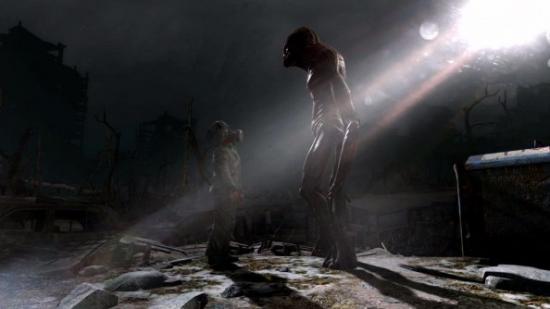I’m always surprised when I get the bad ending in Metro games.
In both the original Metro 2033 and now Metro: Last Light, I’ve played what I thought were pretty “moral” games. I’ve not killed lightly, though I’ve definitely gotten my hands dirty when I had to. I defended myself as best I could, helped people out when I could. But in the end, that’s not good enough. My character is not evil. The Metro games don’t really let you be evil. I’m just… human.
I wouldn’t call Metro: Last Light a particularly successful game. It is a more commercial product than its predecessor, and it wears its pragmatic calculations too much on its sleeve. It does not earn its big moments, opting instead for quicktime events and heavily scripted sequences, and the result is a game that feels far narrower than its predecessor.
Plus there’s a sex scene that’s lost so deep inside the uncanny valley that it emerges on the border of necrophilia.
But its morality fascinates me. It’s more ambiguous than most videogames’ morality systems, and more subtle. Both Last Light and Metro 2033 both seem to say that avoiding evil is not enough. The odd good deed is not enough. They’re not really concerned with good and evil, but empathy and fear.
I thought I’d learned my lesson with Metro 2033, when I helped Artyom drop nuclear warheads on a budding civilization of Dark Ones: post-human survivors of the apocalypse who have become the apex predator of the wasteland. They are set up to be terrifying, looking like surreal daguerreotypes, able to invade thoughts and haunt dreams.
But of course, in the finale of Metro 2033, it turns out that they have been trying to make contact with you for the entire game. They are benign, knowing that humans fear them, and knowing that humans will seek to destroy what they fear.

I had to admit, as the credits rolled on Metro 2033, that the game had pegged me pretty well. I’d played selfishly. I’d hoarded cash because I didn’t know when I might need it, to the point where I told a little beggar to get lost rather than slip him a few currency-grade bullets. I’d stolen everything that wasn’t nailed down, assuming that it was just random loot left out for my use. I’d abandoned stealth for slaughter whenever I felt like trying to sneak around would pose too great a risk, which was always. I’d played it safe, and as the nukes landed on a budding posthuman civilization, I could not deny that the ending fit the pattern I’d established.
I tried to be better in Metro: Last Light, and I suppose I was. I tried to be a little more generous to the few NPC’s who needed charity, and I used the magic knockout button to avoid killing guards, but I was still fundamentally paranoid.
One of the most effective things in Last Light is the way the Little Dark One lets you see the world through its eyes. At odd times, he touches Artyom’s mind and shades in the world with the things he cannot see. You can see creatures moving in the dark, and whether they are hostile (red) or indifferent (blue-green). And what struck me is how often the creatures that I was used to killing on sight really meant no harm at all.
A lot of this is just level scripting, of course. When the Little Dark One is around, you encounter more AI creatures who are more interested in following a set path than trying to kill Artyom. But there were also times I realized that I’d probably been the aggressor, that I’d opened fire on a herd of creatures who were simply passing by, just because I’d been conditioned to fear them. That’d depopulated entire levels when I could have just run or sneaked through.

The Little Dark One, at one point, chases off one of the scariest creatures of the surface, a winged Demon, and comments that they’re fast, but dumb. And I realized just how completely a fish-out-of-water I was here, and always would be. I could not see any of the creatures in the game as anything less than nightmares come to life, and if I had the ammunition, I’d kill just about anything that came near me. Demons were, on balance, not terribly threatening. I’m not sure one of them ever even killed my character. But I obsessed over them,getting off point-blank shotgun blasts against them whenever I could.
The other name for the Dark Ones is the Homo Novus, and it’s clear by the end of Last Light that their greatest power is the ability to live in the world without constantly warring against it. Humanity, by contrast, is driven not just to survive, but to destroy any sources of fear it can imagine. What you find through the Little Dark One’s eyes is a world full of dangers, yes, but not malice.
I think that explains the oddities of Last Light’s morality system, which judges wanton killing, theft, and indifference as harshly as you might expect, but also rewards exploration and listening (except where strippers are concerned). Most of the good deeds Artyom can commit are not the big, neon-lit MORAL CHOICE moments we’re used to from games. There are a couple of those in Last Light, but they’re not weighted so heavily as to sway Artyom onto the side of the angels. Rather, most of the good Artyom can do is simply by bearing witness to life and death in Metro, to listening to what other characters say.

The late comedian Bill Hicks said, toward the end of one of his acts, that the fate of the world will come down to “A choice, right now, between fear and love. The eyes of fear wants you to put bigger locks on your door, buy guns, close yourself off. The eyes of love, instead see all of us as one.”
I think Metro: Last Light is fundamentally aligned with that sense of morality. That being humane and decent requires, above all, openness and compassion. And it doesn’t necessarily start with virtuous acts. A shooter like the Metro games doesn’t give you many chances for them, anyway. But what it can do is check whether you’ve mastered your fear long enough to go into the dark places, to walk in peace among ghosts and grief, and to pay respect to lives lived and lost.
